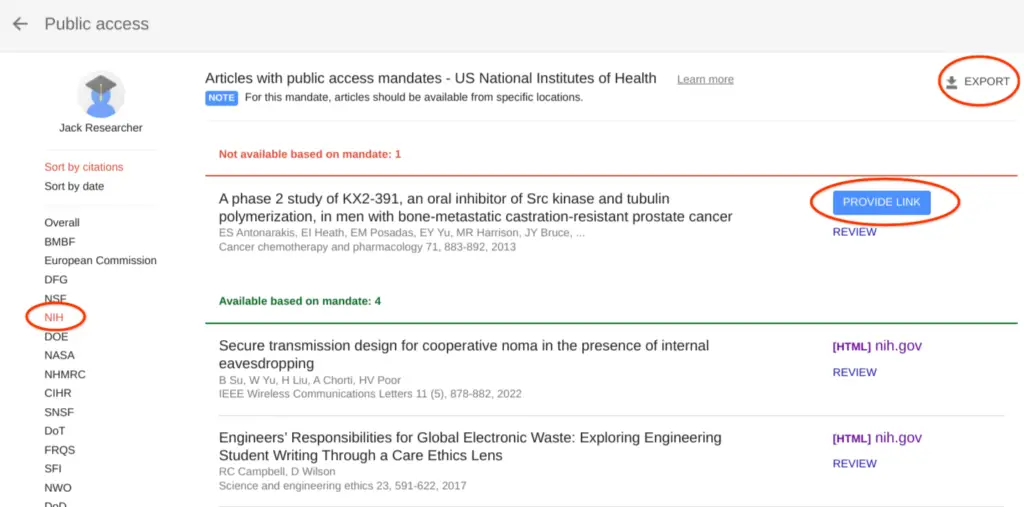As a researcher, ensuring compliance with public access mandates for your funded articles is crucial. With Google Scholar’s latest update, managing and tracking public access reports for your funding agencies has become even easier. In this article, ilovephd explores the new features of Google Scholar’s Public Access section that allow you to effortlessly review, export, and update public access reports, helping you stay compliant with funding agency requirements and contribute to the advancement of knowledge.
Google Scholar Public Access Reports
Google Scholar has introduced a user-friendly interface that provides a comprehensive overview of your articles funded by different agencies. This feature is available only for public profiles.
On the Public Access page in your profile, you’ll find a list of agencies that have funded your articles. You can review the public access report for each agency by simply clicking on its name. This allows you to quickly assess the public access status of your articles for each funding agency in one place.
One of the significant updates is the ability to export public access reports for inclusion in your project reports or other uses. With just a click of a button, you can now generate a public access summary for each funding agency and save it for your records or share it with your collaborators or funding agency representatives.

This makes it convenient and efficient to comply with reporting requirements and demonstrate compliance with public access mandates.
Google Scholar’s public access reports also take into account the specific requirements of each funding agency. Some agencies may require articles to be available in a particular repository, while others may allow any subject or institutional repository, or even anywhere on the web. The public access reports provide links to the appropriate repositories where your articles are available, making it easy for you to verify the compliance of your articles with the requirements of each funding agency.
If you don’t see a link for an available article, you can also provide the link to Google Scholar, and they will crawl and index the link to automatically update your public access reports. Furthermore, for agencies that specify a particular repository, Google Scholar includes a link to directly submit your article to that repository, saving you time and effort in meeting the mandates of your funding agencies.
In addition to tracking and exporting public access reports, Google Scholar allows you to correct any errors or update information on your public access reports. You have the flexibility to remove articles, correct publication dates, or update funding information as needed. This ensures that your public access reports accurately reflect the compliance status of your articles and helps you maintain good standing with your funding agencies.
Complying with public access mandates not only ensures that your research is accessible to a wider audience, but it also contributes to the advancement of knowledge by allowing researchers to build upon each other’s work.
Google Scholar’s Public Access section provides a valuable tool for researchers to manage and track their compliance with funding agency requirements, making it easier to work at the frontier of knowledge.
In conclusion, Google Scholar’s Public Access section offers a convenient and efficient way for researchers to review, export, and manage public access reports for their funding agencies. With features such as agency-specific reports, export options, error correction, and repository submission links, Google Scholar streamlines the process of complying with public access mandates.
By using Google Scholar’s Public Access section, researchers can ensure that their articles are accessible to a wider audience, contribute to the advancement of knowledge, and maintain good standing with their funding agencies. Stay compliant and stay at the forefront of research with Google Scholar’s Public Access reports